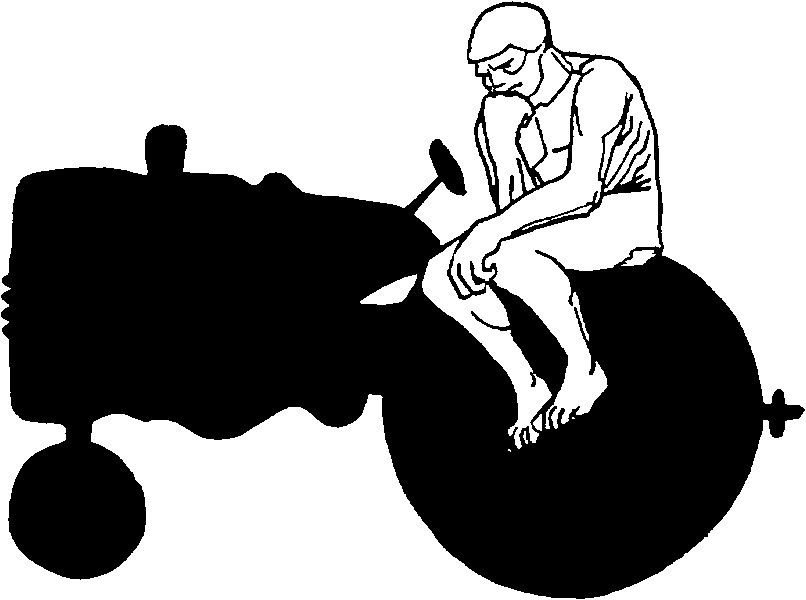27th Great American Think-Off
Congratulations to all 4 finalists!
Read the winning essays below
The four finalists for the 2019 Great American Think-Off are (in alphabetical order): Rick Brundage of St. Paul, MN; David Lapakko of Richfield, MN; Louise Mengelkoch of Lake Oswego, OR; and Jennifer Nelson of Fridley, MN. Mengelkoch and Nelson argued YES, voting matters, while Brundage and Lapakko argued NO, voting does not matter. Jennifer Nelson won the debate on June 8, 2019, while Rick Brundage came in second.
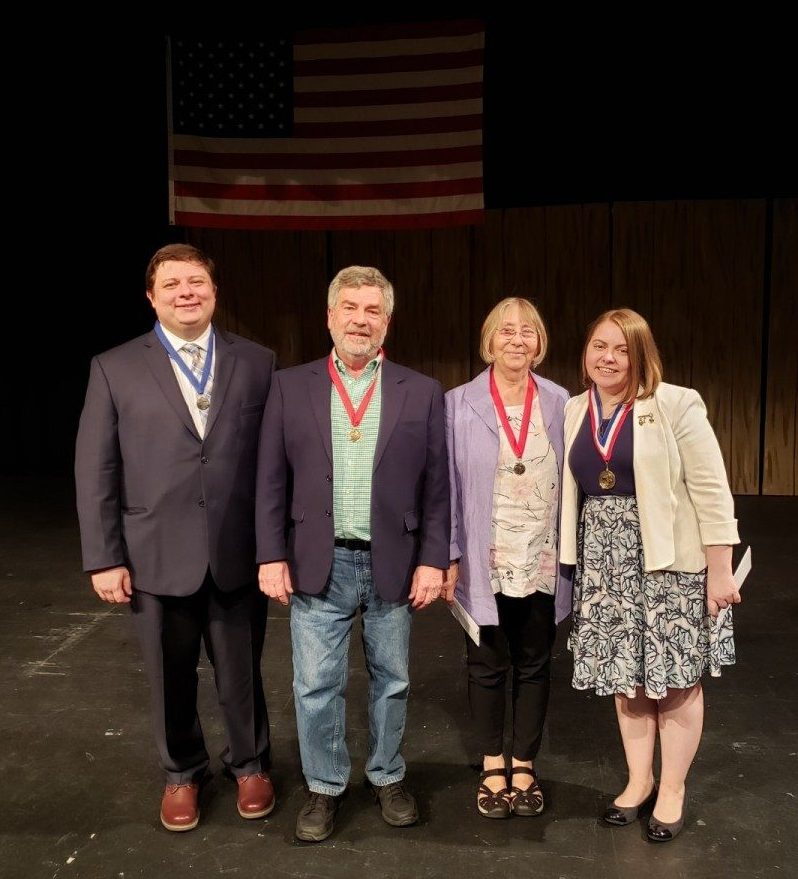
Read the 2019 Think-Off Finalists’ award-winning essays below:
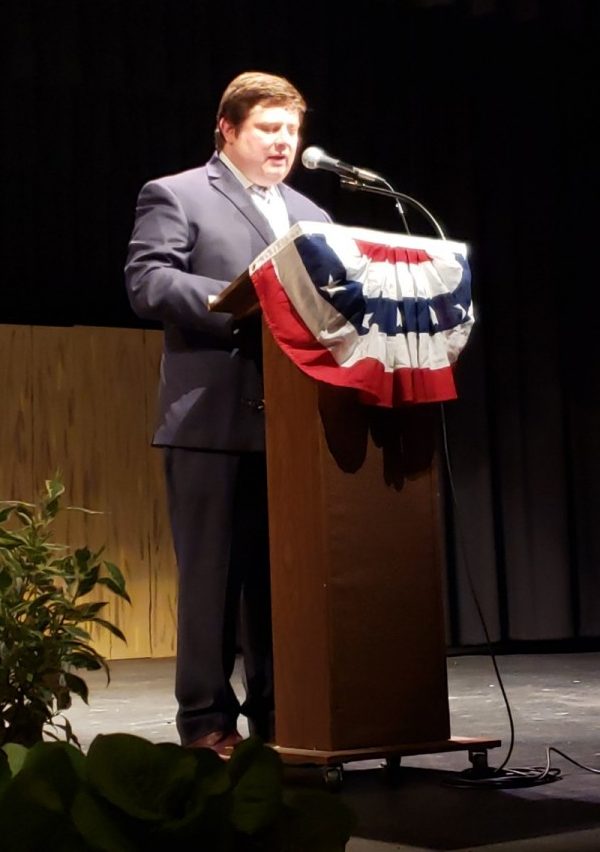 Rick Brundage
Rick Brundage
No.
Voting is frustrating.
Part of my frustration was that my vote felt like it did not count. The injustices that I see taking place haven’t changed because of my vote, and my specific vote is unlikely to ever be able to materialize an ideal world.
My vote has sometimes expressed my interest in having one candidate over another, but rarely did our society move closer to the kind of world that I wanted that vote to express.
I had to make a choice to continue to be frustrated or to make a change. Frustration was not a real option, so I resolved to have conversations with people. Instead of letting my civic engagement begin and end at voting, which often only of plurality of people even do, I became determined to change minds. I found a candidate I believed in, I sent an email about volunteering, and within a week, I was calling people to have conversations about how they wanted to be represented (note: if I called you during dinner, I really did mean it when I said I was sorry). Eventually, I dropped everything to continue working on that campaign, and that was about all I could do to not personally feel hopeless in a political system that otherwise felt faceless and impersonal. I finally felt like my participation mattered.
What is even more frustrating is that the people in power frustrate the vote. I remember in high school the first time I read about how some places allow you to vote for “none of the above” as an option. None of my elections did that. I learned that if you don’t like your options, your vote can’t express your displeasure. I remember Bush V. Gore, when instead of counting all the votes, the Supreme Court stopped Florida from doing so. Even if you do vote, nine judges with lifetime appointments, a few of whom probably don’t share your values, will decide that your vote doesn’t get to count. Now, I see the pushes to have voter ID laws that disenfranchise the elderly, the poor, people of color, and specifically, this cycle, Native Americans in North Dakota, to solve the functionally non-existent problem of “voter fraud”. I also saw the proponents of these measures harvesting ballots in North Carolina for their side. Lesson learned: Even if you desperately want to vote, you never know when you’re going to get cheated out of it. I hear the voices of students pleading for common-sense gun regulation, most of whom are not legally eligible to vote, while the people that do get votes are busy arguing whether or not teachers should have to mentally and physically prepare themselves to use lethal force against the young minds that they are supposed to care for.
Young people can’t use the vote to be heard, while the voting population ends distracts us from meaningfully listening to them and taking action.
Finally, even if you do get to vote, your vote is counted, and it accurately represents your preferences, the Electoral College and our system of Congressional representation is unfair. There is no non-arbitrary reason to say that one person’s vote should count for more than another person’s vote, so setting up our system in a way that denies this principle undermines the value of voting. Consider that Wyoming has three electoral votes with a population of around 600,000 residents, meaning that each electoral vote represents the will of around 200,000 people. California, on the other hand, has a population of around 37 million people and 55 electoral votes, which means that each elector represents more than 650,000 people. In other words, Wyoming voters get three times more bang for their buck than Californians because they live in a less-densely populated state. The fact that we have had two Presidents in the last twenty years that were not popularly elected proves a simple truth – your vote probably doesn’t count in any way that is close to being fair.
I’m not saying I won’t vote, but I’m not assuming that it is likely to matter. The participation that does matter to me are the conversations I have with strangers that might change how they treat their neighbors or doing service to help those who are struggling to get by because of our failed politics. Voting doesn’t make a democracy great, it is our substantive engagement with others that does, and this realization makes me feel less frustrated.
~~~
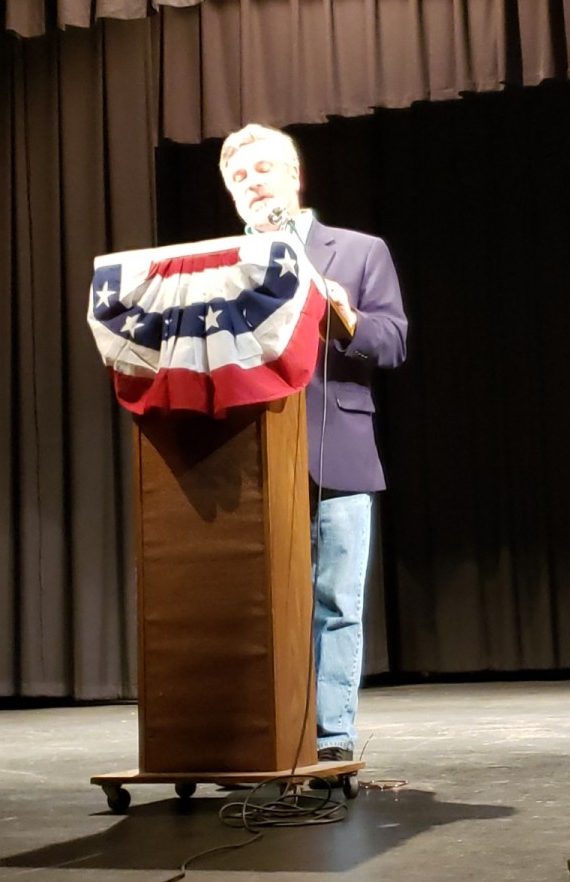 David Lapakko
David Lapakko
No.
Let’s try to distinguish between what matters and what doesn’t. For example, it matters that the Think-Off is being held in New York Mills rather than New York City. It doesn’t matter whether it’s in the auditorium or the gymnasium. It matters that you have gasoline in your tank. It doesn’t really matter what brand it is. It matters that if you’re standing on the edge of a 10-story building you should keep your balance. It doesn’t matter if you do so in the elevator on the way up.
With that distinction in mind, far more often than not, voting doesn’t really matter. Any dictionary will tell you that things which matter are important and significant.
We like to think voting will make a difference, but 99 percent of the time, it simply won’t.
I hate to be the bearer of bad news, but that’s the cold, hard, objective truth. I looked more closely at all 506 elections in 2018 involving state governors, U.S. Representatives, or U.S. Senators. Most of them were incredibly lopsided for one side or the other; close elections were almost nonexistent. Of those 506, 99.4 percent were decided by more than 1,000 votes. Unless you lived in California, Georgia, or Utah, 100 percent of the contests were determined by more than 1,000 votes. Indeed, it was rare to find races that were decided by even fewer than 10,000 votes; in 94 percent of them, the winner prevailed by a margin well beyond 10,000.
My stance is somewhat paradoxical: although we should consider it a civic duty to vote, the reality is that almost every time it will not matter, certainly in terms of the outcome. But it’s a bit like Powerball: you can “never say never,” and in theory, there may come a time when your vote swings an election. Just don’t hold your breath!
That truth gets in the way of some very romantic ideals. One romantic illusion goes like this: if only we could get more people out to vote, we could change the world—that’s why voting matters! But this assumes everyone believes as we do. Sorry to say that a bunch of them are those “ignorant scoundrels” whose votes will cancel ours out. Such romantic ideals can also mislead people into thinking they have done something at the polls which is so significant that they can prop up their feet, watch Netflix, and wait two years for the next election. That’s misguided as well.
So if voting doesn’t matter, what does?
I think of my amazing mother, who passed away many years ago. Her one vote in November was basically irrelevant. But as a lobbyist at the state legislature, she was a force to be reckoned with. Political office holders listened to her—they had to, because she represented thousands of their constituents. That mattered.
I think of people like Sean Hannity, or Rush Limbaugh, or Rachel Maddow, or Stephen Colbert. They each have only one vote, but millions of other voters watch and listen to them. That matters.
In our community, I voted for mayor this past year, and she won. The hitch is that she ran unopposed; my vote for her was meaningless. But what wasn’t meaningless was running into Her Honor at a local restaurant and giving her a good piece of my mind about a proposed roundabout for our neighborhood. That person-to-person contact almost by nature has more impact than casting a single vote. A friend of mine regularly volunteers at a homeless shelter, and in one morning she does more that matters than the rest of us will do at any polling place. Even a well-written letter to the editor in a large circulation newspaper offers the promise that thousands of others will pay attention to you. Voting, on the other hand, is done behind a curtain, in total anonymity.
In the end, voting is akin to taking your daily multi-vitamin. It’s the right thing to do. Theoretically, it could make a difference. But in the end, what’s more likely to determine your health are your genetics, whether you binge on sausage pizzas or smoke two packs a day, and whether the only exercise you get is picking up the remote.
Voting is a civic responsibility, but we shouldn’t over-romanticize it.
At some level, everything matters, so it’s really a question of what matters most. And compared to other more meaningful forms of political participation, voting doesn’t really matter all that much.
~~~
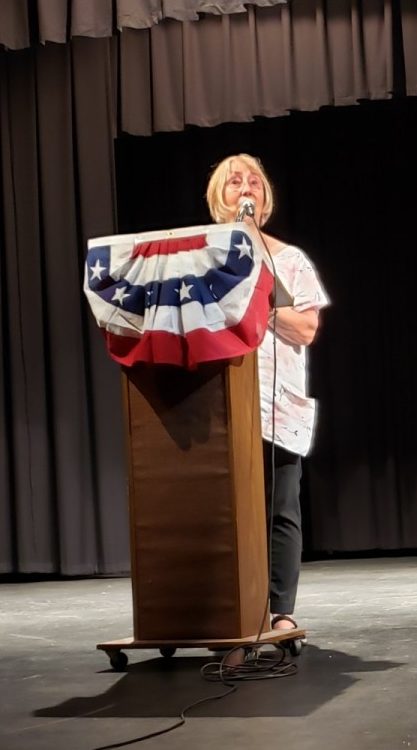 Louise Mengelkoch
Louise Mengelkoch
Yes.
TO VOTE OR NOT TO VOTE: IT ABSOLUTELY MATTERS!
When I was a child in the ‘50s, election day was like a holy day of obligation in our family. On those First Tuesdays we would head to our polling place after Mom and Dad got home from work. Going into that polling booth was a sacred event. Then we’d go home and eat TV dinners while we stayed glued to the radio and television awaiting the results. Sometimes it went on late into the night, but I was allowed to stay up for as long as it took. Some nights were cause for celebration. Some were not. But it was always thrilling and ceremonial. And it felt important.
Since then, I have become a diligent voter, keeping up my voter registration and boning up on candidates and issues. I find it dramatic in the same way many people do college and pro sports because I know deep down that it matters.
It matters for my own self-interest. If I want something from the government – benefits, people I admire in charge of things, to endorse a war or to prevent a war – I need to add my voice to the debate. Elections are won and lost by razer-thin margins all the time. Even if the polls show that victory is more than likely for my candidate, it matters by how wide a margin. Did my candidate have a mandate or did he or she just squeak out a victory? Either way, it has a profound effect on how winning candidates will govern and how they will be challenged in future elections.
But I believe my vote matters for less selfish reasons. I am a woman, so my vote matters to honor the brave women who fought for the franchise, which wasn’t granted until 1929, twenty years after my own mother was born. Native Americans, who weren’t even granted citizenship until 1924, should honor their ancestors by voting. African-Americans’ votes matter because the shocking fight against voter suppression goes on yet today. Even white men without property had to fight to get the vote.
What does it say about our character if we dismiss the struggles of all those who put their lives on the line so that we could have a say in our government? And why would they have fought so hard for something that doesn’t matter?
I’ve always thought Kant’s categorical imperative provided a sensible guideline for living. He said we should always ask ourselves this question: What if everyone did as I’m doing? In this case, what if nobody thought his or her vote mattered and didn’t bother to exercise the franchise? The answer is obviously disturbing. And if you really don’t think one vote matters, do a hundred votes matter? A thousand? Think about how you can convince that many people to vote as you do.
My vote matters because it’s a way to honor my parents, who took the time to study up on issues and candidates and go to the polls after long days of hard work. Their example inspired me to believe that voting is worth the trouble. I’m proud to say that my four children are all voters too, and I have to believe it’s due to the example set in our household. And a funny thing happens when we are forced to inform ourselves about what we are voting for or against. We learn stuff. We understand issues better. We come to care about how things unfold. We begin to influence other people because we are better able to articulate arguments.
About five years ago I moved to Oregon and election day was upon us before I even had a chance to inform myself about candidates and issues. What did I do? I sought out the people I’d met in my new community who seemed smart and knowledgeable about those things on the ballot. I listened to them and, for the most part, followed their guidance.
An informed voter has a sphere of influence that multiplies the power of that vote exponentially.
That power matters and it’s been given to you as a gift by those who came before us. Honor that gift.
~~~
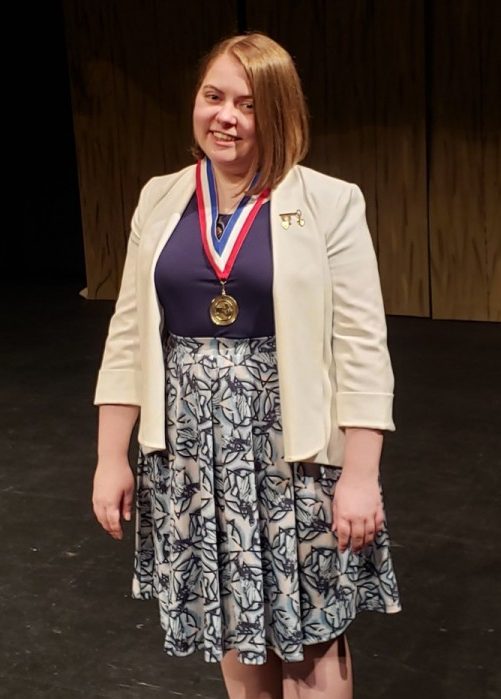 Jennifer Nelson
Jennifer Nelson
Yes
My grandmother was born into a world that didn’t allow women to vote. Although they were required to live under the policies put into place by local, state, and federal governments, women at that time had no say in which individuals would decide what those policies would be. This all changed when the 19th amendment to the U.S. Constitution was ratified and women in the United States were finally allowed the right to vote. This right didn’t come quietly or gently. It was the result of bold individuals who fought for decades to secure these rights. My grandmother never took that right for granted. She made sure that she voted in every election as long as she lived. She cast her final vote in the 2016 general election, passing away the following October at the age of 104.
For those who’ve grown up far removed from that fight, it can be easy to take voting for granted. We vote on a class motto for graduation, on what movie to see among a group of friends, on who should win a local debate competition, and on which contestant we want to continue on in a reality TV show. However, in each of these examples we can soon see the impact of our vote. The chosen motto graces the cover of our graduation program, we see that movie, the winner of the debate is declared, and the entertainment our favorite reality show provides us continues, hopefully with our selected contestant still in the running.
In the case of casting a vote for our government officials, that personal benefit isn’t always as immediately obvious to voters. I’ve heard more than one person say “My vote doesn’t really matter.” Even in states with the highest average voter turnout (60-70%), nearly a third of voters opt to stay home. For some it seems like too much of a hassle. For others it seems like the system is corrupt and unresponsive. Many feel that a single vote is unlikely to make a difference, so why bother. But voting was never intended to be solely about individual benefit and expression. Rather, it is a way to raise a collective voice.
The reality is, that it’s true that it is highly unlikely that your vote will ever be the deciding vote during an election. However, that’s not to say it doesn’t matter.
To vote isn’t merely to assert your own opinion and seek your own benefit. At its core, voting is a practice in empathy. It is an opportunity to look at our neighbors and our world and imagine what changes would make them better and who could help make the changes to make things better.
The women who marched, protested, and engaged in hunger strikes knew this. The civil rights activists who marched across the Edmund Pettus Bridge only to be brutally beaten by the police knew this. They fought for this right knowing that they may never see the benefits, willing to die to secure to the electoral voice of future generations.
The ballot didn’t immediately solve the systemic problems that faced them. For women and people of color, they continued (and still continue) to face barriers in our society.
But they knew that voting wasn’t merely an act of expressing an opinion, but an act of exercising power. In a world where so many of us so frequently feel powerless, what can matter more than that?
Even more so, we’ve often seen that exercising that power at the polls often leads people to build on that power in other aspects of their lives. From voter to volunteer to advocate to community educator to citizen lobbyist, people begin to see that to get the system and policies they want, they must execute what power they have and build from there.
Many look only at the federal government and assume our voice matters little. By our vote also determines state and local officials, school boards, and judges. The people we help place into power can pass laws or uphold policies that either remove or reinforce barriers to our well-being…in areas of healthcare, education, and economic security. Voting may seem like a small thing in light of such problems, but we’ve seen those issues experience major changes due to electoral action. Voting is an important piece of how we try to do good for one another. As Sharon Salzberg wrote, “Voting is the expression of our commitment to ourselves, one another, this country, and the world.”
